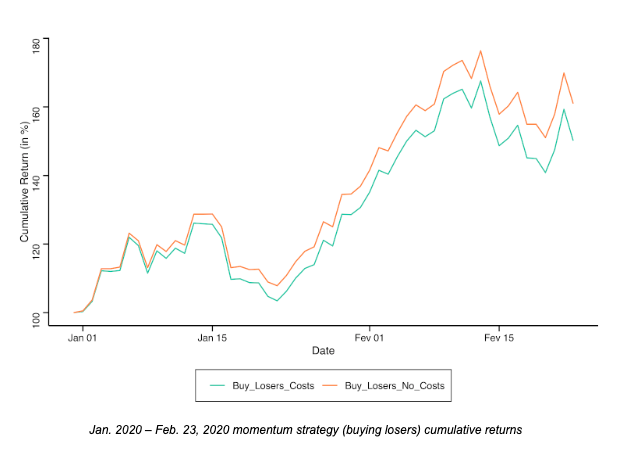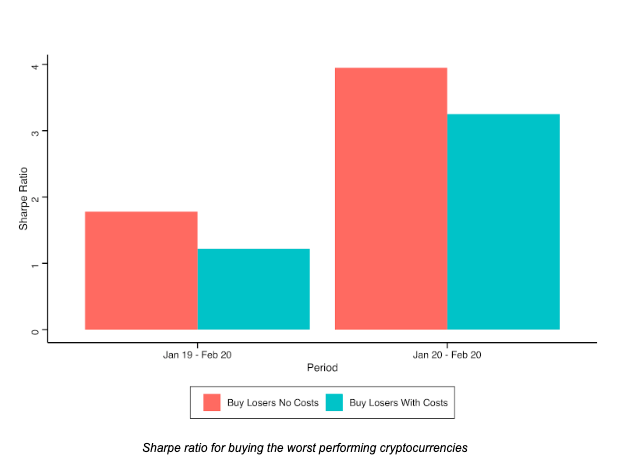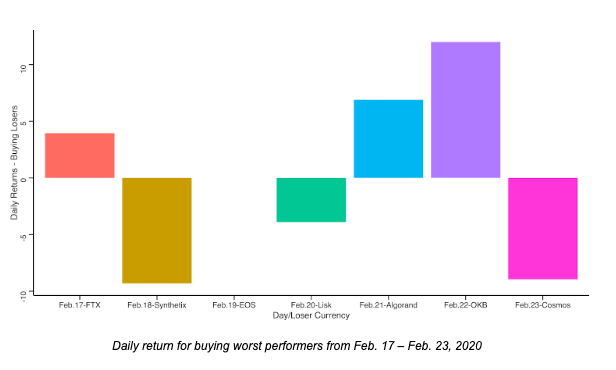This week as equities markets plummeted across the globe, Bitcoin (BTC) price also faced a sharp correction. Over the past week Bitcoin price has dropped $1,500 and currently trades at $8,454, a new four week low.
Since the start of the year Bitcoin and most major altcoins showed an impressive gain in price, leading analysts to suggest that a bull-run was brewing for 2020, an idea now being challenged by the current pull-back.
As has been the norm, on one side, there are bullish enthusiasts aiming for sky-high valuations; on the other, there are more conservative analysts raising questions about the viability of crypto. The large swings and explosive behavior of the crypto market is what makes them an attractive investment option when compared to other assets but the indecisiveness of the current market is also forcing investors to expand their strategies and adjust them frequently.

Cryptocurrency market weekly overview. Source: Coin360
One strategy based on this underlying rationale is momentum investing. As a refresher: A momentum strategy consists of analyzing daily returns for an asset (e.g. cryptocurrencies, stocks, indexes, etc) and allocating the worst and the best performers into baskets.
The strategy is found to be lucrative in traditional markets where investors buy the best-performing baskets and sell (short) the worst performing baskets or to put simply, they are bullish on the past winners and pessimistic regarding the past losers.
As a variation from the original strategy, an individual asset can be chosen as the best/worst performing asset that day instead of investing in baskets. Following this method, an investor would retrieve daily data for the best and worst performing asset, hold it for 1 day then sell for a profit on the following day.
Momentum strategy for the top-50 cryptos
As previously reported by Cointelegraph, research on cryptocurrency price action found that applying a momentum strategy to the top-20 currencies in the market was profitable if an investor bought the best performing currency instead of the worst performing currency each day.
By expanding the sample to the top-50 currencies in the market, investors can explore even larger swings from lower market-capped coins that can offer investors a higher return but also expose one to a higher risk level.
After identifying the daily winners and losers from the top-50, we assume that an investor holds each crypto for 1 day – buys its closing price that day and sells it the following day at the closing price.
Surprisingly, investors employing this strategy daily from January 1, 2019 to February 23, 2020, would generate a profit instead by buying the worst-performing currency — this is opposite to traditional markets. An investor would have achieved a cumulative return of 367% by buying the worst-performing cryptocurrencies (buying the losers) throughout this period.
However, when accounting for a transaction cost of 0.1%, in order to reflect a real investment scenario, the cumulative returns of this strategy are reduced to 284%. On the other side of this strategy, an investor who buys the best performing cryptocurrencies and sells them the following day gets a high negative return for this period – the opposite result to what is found in stocks.


From an annualized Sharpe ratio perspective, meaning, the return an investor gets for its risk exposure, the buying the losers strategy offers a great option as the Sharpe ratio is 1.78 when no transaction costs are considered. When those come into play, naturally, the Sharpe ratio reduces to 1.22. A Sharpe ratio under 1 is considering sub-par, while over 1 it is considered a reasonable outcome.
Which cryptos performed best and worst?
As seen in the top-20 scenario, Bitcoin, Ether (ETH), XRP, Bitcoin Cash (BCH) and Binance Coin (BNB) rarely appear as the daily worst-performing cryptos. Smaller cryptocurrencies such as Synthetix Network Token (SNX) are very volatile and appeared more than 40 times as the worst and the best-performing crypto on different days.
Additionally, during this period observed, Crypto.com Coin (CRO) and Bitcoin Diamond (BCD) follow as the ones with most negative appearances — 32 and 23 times, respectively.


Top-50, momentum investing, and a deeper look into 2020
Looking at the first month and a half of 2020, an investor employing the buying the losers strategy during this period would have generated a cumulative return of 160% (no costs) and of 150% when accounting for the aforementioned transaction rate.


From a risk-adjusted performance perspective, buying the losers strategy offers a great alternative for investors with a Sharpe ratio of 3.95 (no transaction costs) and a Sharpe ratio of 3.25 when accounting for the transaction costs.


The behavior during the last 7 days (from Feb. 17 – Feb 23)
During the last 7 days of this analysis, to incorporate the recent market reactions, we found that the strategy yielded a very low cumulative return of 0.66% when transaction costs were not considered. When accounting for the transaction rate, the cumulative return becomes negative at -0.74%.


Buying the top-50 is a better option for investors
Underlying market shifts like the increasing liquidity of top coins mitigates some of the risks involved with momentum investing. However, as happens with smaller capped cryptocurrencies, liquidity issues may still arise from employing this type of strategy as some of the currencies in the analysis may not generate sufficient buy or sell volume for investors to easily enter and exit positions.
Looking forward, expanding the momentum strategy to the top-50 cryptocurrencies gives investors a greater cumulative return and better risk-adjusted-performance. Moreover, the swings at the start of the year still make an attractive option for the future backed by consistent returns over different periods. However, investors should be aware that the best strategy may vary from time to time and adjust accordingly as we have seen from the last 7 days shift.
The views and opinions expressed here are solely those of the author and do not necessarily reflect the views of Cointelegraph. Every investment and trading move involves risk. You should conduct your own research when making a decision.
